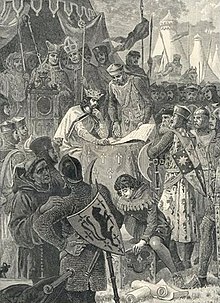Hmm.
Still, from a game perspective ... they want there to be some penalty for high taxation (as they want higher taxes to always produce more gold, albeit with increasingly less returns, as opposed to bleeding the taxbase dry).
The Magna Carta was signed in part because the nobles were really upset about the excessive taxes of King John, and it is possible that they were threatening Civil War.
below is an excerpt from Wikipedia (yes I know, its wikipedia ...) to demonstrate my point.
"In 1215 some of the most important barons engaged in open rebellion against their King. Such rebellions were not particularly unusual in this period. Every king since William the Conqueror had faced rebellions. However, in every previous case there had been an obvious alternative monarch around whom the rebellion could rally. In 1215, however, John had no obvious replacement. Arthur of Brittany would have been a possibility, if he had not disappeared (widely believed to have been murdered on the orders of John). The next closest possible alternative was Prince Louis of France, but as the husband of Henry II's granddaughter, his claim was tenuous, and the English had been at war with the French for thirty years. Instead of a claimant to the throne, the barons decided to base their rebellion around John's oppressive government. In January 1215, the barons made an oath that they would "stand fast for the liberty of the church and the realm", and they demanded that King John confirm the Charter of Liberties, from what they viewed as a golden age.

John of England signs Magna Carta. Illustration from
Cassell's History of England (1902)
John prevaricated. During negotiations between January and June 1215, a document was produced, which historians have termed 'The Unknown Charter of Liberties',[8] seven of the articles of which would later appear in the 'Articles of the Barons' and the Runnymede Charter.[9] In May, King John offered to submit issues to a committee of arbitration with the Pope as supreme arbiter,[10] but the barons continued in their defiance. With the support of Prince Louis the French Heir and of King Alexander II of the Scots, they entered London in force on 10 June 1215,[11] with the city showing its sympathy with their cause by opening its gates to them. They, and many of the moderates not in overt rebellion, forced King John to agree to a document later known as the 'Articles of the Barons', to which his Great Seal was attached in the meadow at Runnymede on 15 June 1215. In return, the barons renewed their oaths of fealty to King John on 19 June 1215."
The nobles considered his rule oppressive and worthy rebellion, even though it was only sloppy rule. Primarily the reason for their rebellion was likely the high taxes.
Indeed, the American 'Revolution' in 1776 went along similar lines, although instead of placing another king in charge they went the extra mile and actually created a new form of government.

